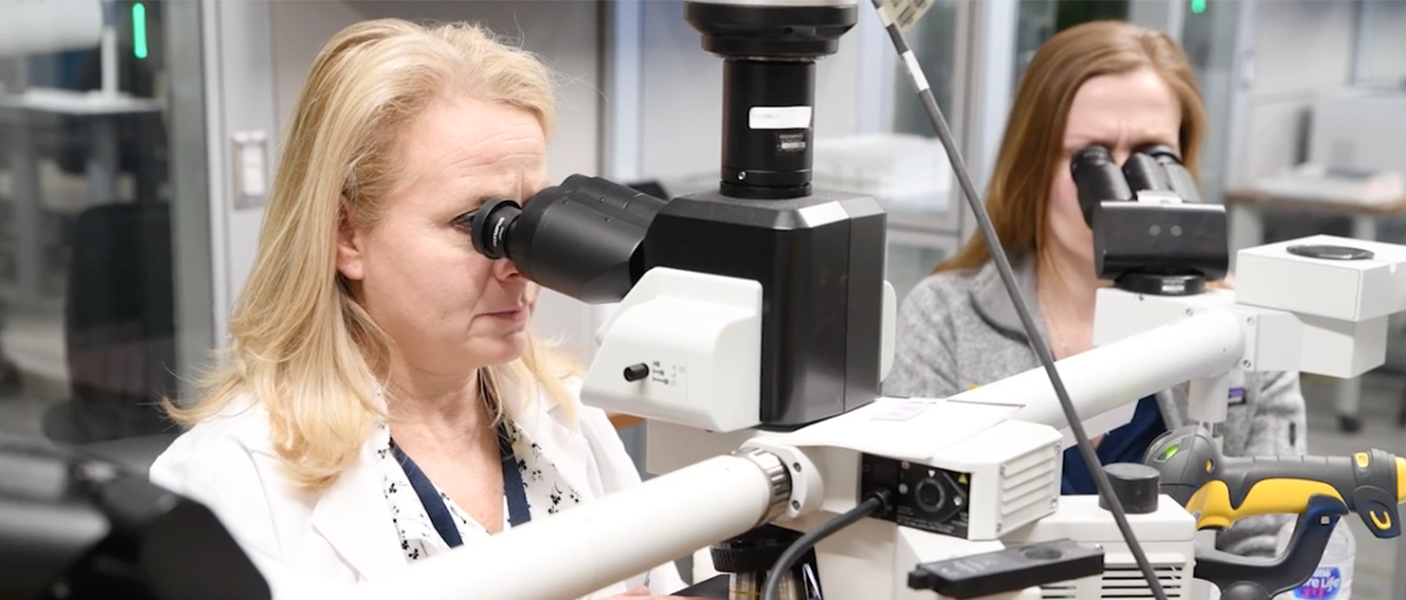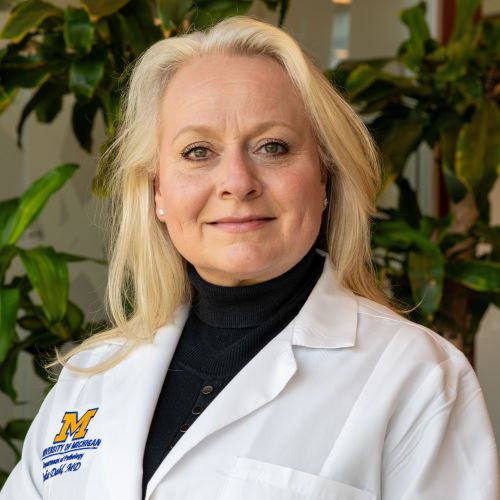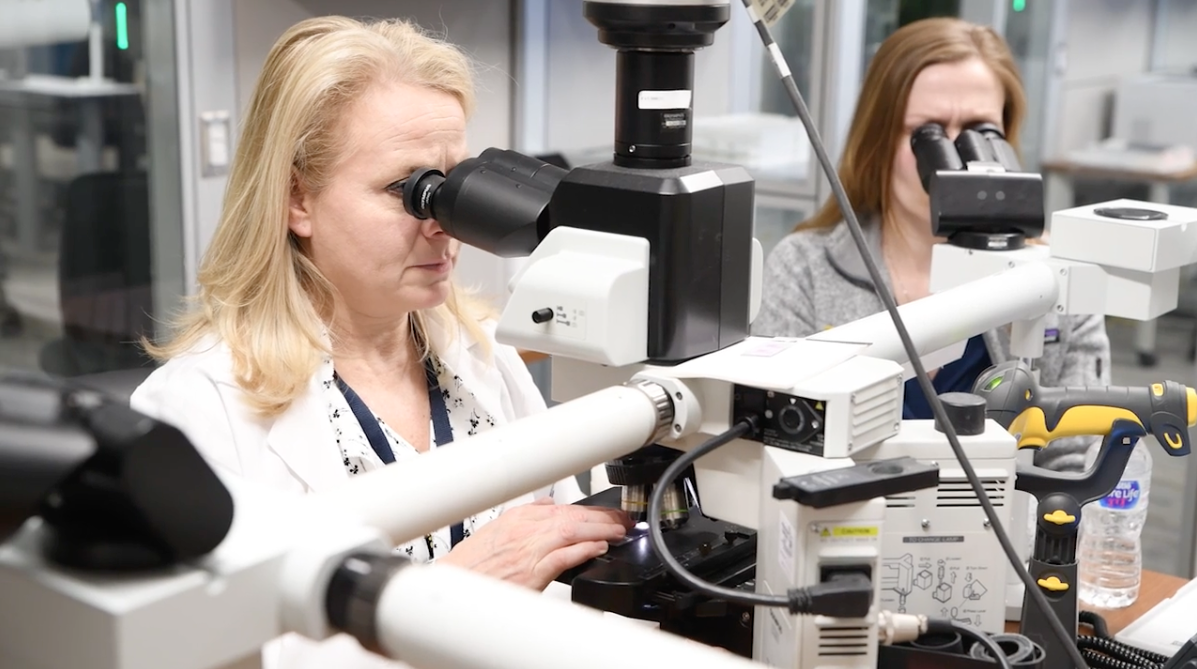

 The Department of Pathology has a division that is unlike any of its other divisions in that its primary focus is on making our laboratories and pathologists accessible to patients outside of Michigan Medicine. Michigan Medicine Laboratories, known as MLabs, provides access to the expertise of our Pathologists to patients around the world via consultations, and provides much of the pre-analytical logistics and planning to deliver specimens to our anatomic pathology, clinical, and molecular/genomic laboratories. After seven years as its Associate Director, Dr. Julia Dahl has been promoted into the role of Director of this fascinating division.
The Department of Pathology has a division that is unlike any of its other divisions in that its primary focus is on making our laboratories and pathologists accessible to patients outside of Michigan Medicine. Michigan Medicine Laboratories, known as MLabs, provides access to the expertise of our Pathologists to patients around the world via consultations, and provides much of the pre-analytical logistics and planning to deliver specimens to our anatomic pathology, clinical, and molecular/genomic laboratories. After seven years as its Associate Director, Dr. Julia Dahl has been promoted into the role of Director of this fascinating division.
Dr. Dahl is a first-generation physician; the first in her family to pursue a career in medicine. During her second year of medical school, a car accident and experience as a patient caused her to take the next year off from medical school. During that year, a colleague in her original medical school class who shared her interest in surgery opted to do a sub-internship year in pathology. Having discovered pathology himself, he recommended she consider pathology as “pathology is super cool and fun.” Following what turned out to be sage advice, Dahl completed two pathology rotations and was captivated by the depth and breadth of the possibilities. “While I intended to pursue a career in surgery, I had a life-changing event that required me to choose a different path, which is kind of the story of life, right?” stated Dahl, “I love being a diagnostic pathologist.”
Dahl’s AP/CP training was in a private practice-academic medicine hybrid location; with the private hospital (Providence|St. Vincent) receiving 25,000 surgical cases each year and was also able to attend many lectures and engage with faculty at Oregon Health and Sciences University. “For me, a benefit of completing pathology training where I did was the volume of cases, which provided an opportunity to gain “optical mileage” by seeing more cases than the smaller volume at that time in OHSU’s program. Following residency, Dahl completed Surgical Pathology, Immunohistochemistry (yes, it used to be a fellowship) and GI/Liver Pathology fellowships. At University of Washington, Dr. Dahl met her mentor, Dr. Roger Haggitt, who shaped much of how she views being a pathologist, particularly in how she views providing academic consultations. “Roger believed that an important part of consultation is to support pathology as a profession. He taught his fellows to provide consultations that speak to the strengths of the pathologist who is asking for assistance, never putting them down in consultation letters or to others in the department.”
 Upon completion of her fellowship, Dahl first went into private practice at a small hospital, then joined a large GI pathology conglomerate. “I got bored with doing just GI biopsies within that practice,” Dahl recounts. “I opened my own surgical pathology practice and served a safety-net hospital in Memphis, Tennessee, which was exciting and required that I build new skill sets: business and returning to seeing all kinds of cases. That is when I got interested in placental pathology.” She came to Michigan to train with Dr. Rich Lieberman a week at a time as she learned the intricacies of the field. It was through this connection that she met Dr. Jeffrey Myers, then director of MLabs, and years later was recruited to Michigan as the associate director.
Upon completion of her fellowship, Dahl first went into private practice at a small hospital, then joined a large GI pathology conglomerate. “I got bored with doing just GI biopsies within that practice,” Dahl recounts. “I opened my own surgical pathology practice and served a safety-net hospital in Memphis, Tennessee, which was exciting and required that I build new skill sets: business and returning to seeing all kinds of cases. That is when I got interested in placental pathology.” She came to Michigan to train with Dr. Rich Lieberman a week at a time as she learned the intricacies of the field. It was through this connection that she met Dr. Jeffrey Myers, then director of MLabs, and years later was recruited to Michigan as the associate director.
“MLabs is a conduit by which any person on the face of the planet could say, ‘I need Laura Lamps to look at my liver biopsy,’ or ‘I need Priya Kunju to look at my kidney biopsy,’ or I’ve had my blood drawn and I want an exemplary laboratory to perform my tests.’ Patients and any physician can direct their testing to our department of pathology through MLabs.” One of Dahl’s near-term goals is to continue the work toward pre-analytical excellence within MLabs. “Seventy percent of laboratory testing errors are committed in the pre-analytical phase, before it even gets to the laboratory,” she explained. The pre-analytical phase begins when the clinician thinks about doing a test and then orders it. Is it the right test? Someone collects that specimen – did they do it correctly and use the correct blood-draw tube or tissue fixative? Was the specimen labeled correctly? The specimen then gets routed to the laboratory, where it is processed – was everything entered properly? It is then routed to the testing laboratory – was it sent to the right place? Each of these stages are opportunities for errors to creep into the process before the laboratory ever receives the order. “This takes a different kind of error reduction process as it is really about education outside the Department of Pathology. It is creating standard work for those external to the department and having crucial conversations with people who are not doing the work effectively, refining educational materials, and collaborating with those outside the department.” Dahl continued, “Can you imagine what would happen if we cut that 70% in half? The impact for the personnel within the laboratory, our administrative staff, and faculty would be tremendous and the cost savings would likely be significant, too.”
 If all necessary resources were available, where would Dahl like to see MLabs in five years? “MLabs would be an integral engine of the Department of Pathology, ensuring that the laboratory is foundational to Michigan Medicine’s statewide network of clinical care. MLabs already works with UMH-Sparrow Lansing, UMH-West, MyMichigan, and additional clients throughout the state. Leveraging these existing client relationships, we’re working closely with other department leaders to map out paths toward integration with the affiliate laboratories. As the statewide network forms and grows, MLabs would like to expand our client base in support of the department’s investments in molecular and genomic pathology, and to be receiving specimens from the majority of health systems in the region.” Within five years, Dahl envisions MLabs will be providing clear dashboard information to the department that shows the value of the work done and the patient lives touched. To get there, MLabs invested in a platform (hc1) which will provide better visibility into what is happening with their clients, affiliates, and physicians to all department stakeholders. This effort also includes some “off the shelf” capability that will support DQHI and Dr. Lee Schroeder’s work with laboratory utilization and simpler evaluation of send-out testing within the department.
If all necessary resources were available, where would Dahl like to see MLabs in five years? “MLabs would be an integral engine of the Department of Pathology, ensuring that the laboratory is foundational to Michigan Medicine’s statewide network of clinical care. MLabs already works with UMH-Sparrow Lansing, UMH-West, MyMichigan, and additional clients throughout the state. Leveraging these existing client relationships, we’re working closely with other department leaders to map out paths toward integration with the affiliate laboratories. As the statewide network forms and grows, MLabs would like to expand our client base in support of the department’s investments in molecular and genomic pathology, and to be receiving specimens from the majority of health systems in the region.” Within five years, Dahl envisions MLabs will be providing clear dashboard information to the department that shows the value of the work done and the patient lives touched. To get there, MLabs invested in a platform (hc1) which will provide better visibility into what is happening with their clients, affiliates, and physicians to all department stakeholders. This effort also includes some “off the shelf” capability that will support DQHI and Dr. Lee Schroeder’s work with laboratory utilization and simpler evaluation of send-out testing within the department.
On the Anatomic Pathology side, the goal over the next five years is to invest in developing the consultation practice with the hopes of offering digital consultation to outside clients. “We will continue to work with Dr. Kunju and section heads to ensure that our already strong AP consultation practice remains top of mind nationally,” said Dahl. National recognition is important in an academic medical center. “When cases come from around the country, and particularly from other academic medical centers, it is an opening for our junior faculty to be invited as speakers. MLabs wants to provide additional attention to this and support the academic progression of our AP faculty.”
Dahl is also eager to work with Dr. Ric Valdez, Director of Clinical Pathology, to increase the visibility of the faculty and the value their expertise brings when people consider sending testing to a full-service reference laboratory. She wants MLabs to be on the list with ARUP, Mayo Clinical Labs, LabCorp, and Quest when facilities in the region consider reference laboratory services. “So that is MLabs over the next five years. We want to do all we can to ensure that we are representing our faculty well and offering services that are seamless for our clinical colleagues, our clients, and our patients.”
 ON THE COVER
ON THE COVER
Breast team reviewing a patient's slide. (From left to right) Ghassan Allo, Fellow; Laura Walters, Clinical Lecturer; Celina Kleer, Professor. See Article 2014Department Chair |

newsletter
INSIDE PATHOLOGYAbout Our NewsletterInside Pathology is an newsletter published by the Chairman's Office to bring news and updates from inside the department's research and to become familiar with those leading it. It is our hope that those who read it will enjoy hearing about those new and familiar, and perhaps help in furthering our research. CONTENTS
|
 ON THE COVER
ON THE COVER
Autopsy Technician draws blood while working in the Wayne County morgue. See Article 2016Department Chair |

newsletter
INSIDE PATHOLOGYAbout Our NewsletterInside Pathology is an newsletter published by the Chairman's Office to bring news and updates from inside the department's research and to become familiar with those leading it. It is our hope that those who read it will enjoy hearing about those new and familiar, and perhaps help in furthering our research. CONTENTS
|
 ON THE COVER
ON THE COVER
Dr. Sriram Venneti, MD, PhD and Postdoctoral Fellow, Chan Chung, PhD investigate pediatric brain cancer. See Article 2017Department Chair |

newsletter
INSIDE PATHOLOGYAbout Our NewsletterInside Pathology is an newsletter published by the Chairman's Office to bring news and updates from inside the department's research and to become familiar with those leading it. It is our hope that those who read it will enjoy hearing about those new and familiar, and perhaps help in furthering our research. CONTENTS
|
 ON THE COVER
ON THE COVER
Director of the Neuropathology Fellowship, Dr. Sandra Camelo-Piragua serves on the Patient and Family Advisory Council. 2018Department Chair |

newsletter
INSIDE PATHOLOGYAbout Our NewsletterInside Pathology is an newsletter published by the Chairman's Office to bring news and updates from inside the department's research and to become familiar with those leading it. It is our hope that those who read it will enjoy hearing about those new and familiar, and perhaps help in furthering our research. CONTENTS
|
 ON THE COVER
ON THE COVER
Residents Ashley Bradt (left) and William Perry work at a multi-headed scope in our new facility. 2019Department Chair |

newsletter
INSIDE PATHOLOGYAbout Our NewsletterInside Pathology is an newsletter published by the Chairman's Office to bring news and updates from inside the department's research and to become familiar with those leading it. It is our hope that those who read it will enjoy hearing about those new and familiar, and perhaps help in furthering our research. CONTENTS
|
 ON THE COVER
ON THE COVER
Dr. Kristine Konopka (right) instructing residents while using a multi-headed microscope. 2020Department Chair |

newsletter
INSIDE PATHOLOGYAbout Our NewsletterInside Pathology is an newsletter published by the Chairman's Office to bring news and updates from inside the department's research and to become familiar with those leading it. It is our hope that those who read it will enjoy hearing about those new and familiar, and perhaps help in furthering our research. CONTENTS
|
 ON THE COVER
ON THE COVER
Patient specimens poised for COVID-19 PCR testing. 2021Department Chair |

newsletter
INSIDE PATHOLOGYAbout Our NewsletterInside Pathology is an newsletter published by the Chairman's Office to bring news and updates from inside the department's research and to become familiar with those leading it. It is our hope that those who read it will enjoy hearing about those new and familiar, and perhaps help in furthering our research. CONTENTS
|
 ON THE COVER
ON THE COVER
Dr. Pantanowitz demonstrates using machine learning in analyzing slides. 2022Department Chair |

newsletter
INSIDE PATHOLOGYAbout Our NewsletterInside Pathology is an newsletter published by the Chairman's Office to bring news and updates from inside the department's research and to become familiar with those leading it. It is our hope that those who read it will enjoy hearing about those new and familiar, and perhaps help in furthering our research. CONTENTS
|
 ON THE COVER
ON THE COVER
(Left to Right) Drs. Angela Wu, Laura Lamps, and Maria Westerhoff. 2023Department Chair |

newsletter
INSIDE PATHOLOGYAbout Our NewsletterInside Pathology is an newsletter published by the Chairman's Office to bring news and updates from inside the department's research and to become familiar with those leading it. It is our hope that those who read it will enjoy hearing about those new and familiar, and perhaps help in furthering our research. CONTENTS
|
 ON THE COVER
ON THE COVER
Illustration representing the various machines and processing used within our labs. 2024Department Chair |

newsletter
INSIDE PATHOLOGYAbout Our NewsletterInside Pathology is an newsletter published by the Chairman's Office to bring news and updates from inside the department's research and to become familiar with those leading it. It is our hope that those who read it will enjoy hearing about those new and familiar, and perhaps help in furthering our research. CONTENTS
|

MLabs, established in 1985, functions as a portal to provide pathologists, hospitals. and other reference laboratories access to the faculty, staff and laboratories of the University of Michigan Health System’s Department of Pathology. MLabs is a recognized leader for advanced molecular diagnostic testing, helpful consultants and exceptional customer service.